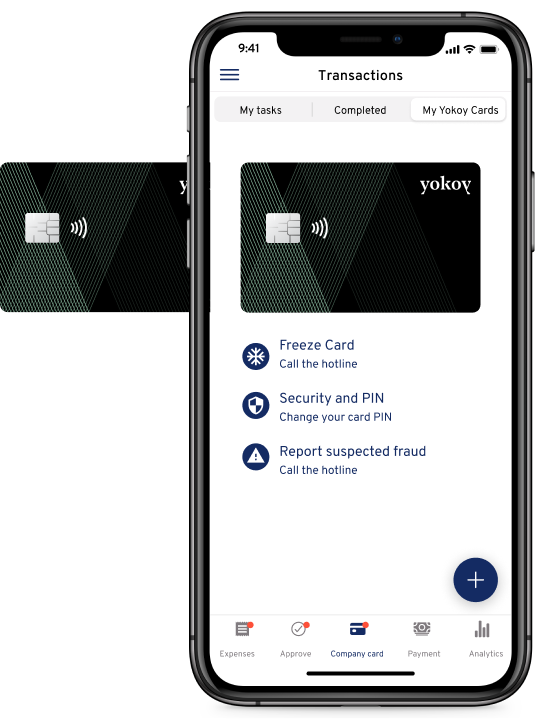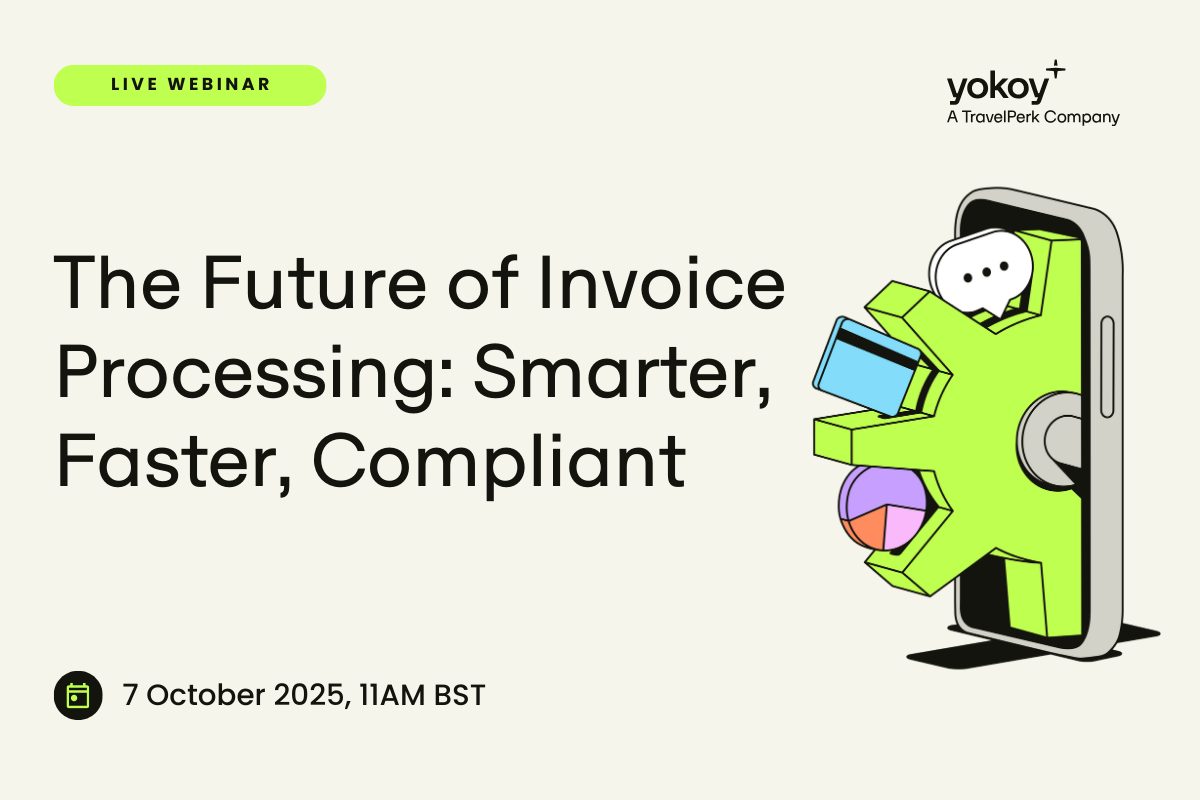Home / POs vs. Card Payments: Choosing the Right Method for Financial Control
POs vs. Card Payments: Choosing the Right Method for Financial Control
- Last updated:
- Blog

When it comes to managing business expenses, companies often weigh the pros and cons of two types of payment methods: purchase orders (POs) and corporate card payments. Both can be appropriate for business needs, but understanding when to use each can sometimes feel like choosing between driving a bus or a bicycle: Each payment option has its own unique strengths depending on the situation.
Let us explain that comparison: Imagine your finance manager handles all your company’s purchases. For large, planned investments like ordering 100 new laptops for the IT department, a PO is like using a bus: It’s convenient, structured, comprehensive and moves everything in the same direction — with every department accounted for and aboard the bus. On the other hand, for smaller, quick-turnaround purchases like picking up office supplies, a corporate card is more like a bicycle: Nimble, fast and perfect for getting where you need to go quickly without too much work upfront.
In this article, we will break down the benefits and drawbacks of both POs and card payments to help you choose the right payment method. Ready to take a deep dive? Let’s explore how you can keep your financial engine running smoothly: Whether you’re driving the bus or pedalling the bike!
Understanding Purchase Orders (POs)
A PO is a formal document issued by a buyer to a supplier, signifying an intent to purchase goods or services at a specified price. The PO includes important details such as item descriptions, quantities, prices, delivery dates, customer data and payment terms. It’s a widely used method for handling large or complex purchases where clear documentation and formal approval are necessary.
POs are typically used for procurement activities that require defined workflows, ensuring that every step of the purchase process is appropriately authorised. This prevents spending that is out of line or unauthorised. Each PO is reviewed by the finance team or relevant stakeholders before being issued to the supplier. This reduces the risk of overspending and improves cash flow management.
The process follows a well-defined sequence and offers strong control over expenses by ensuring that purchases are aligned with approved budgets and internal policies. Additionally, every PO generates a detailed record, from the initial request to the final payment. This level of documentation helps companies track spending and identify discrepancies, making POs a reliable tool for managing high-value purchases and maintaining compliance with internal policies and financial regulations.
Purchase orders can be integrated with an existing financial system’s API or cloud-based platforms, offering more streamlined functionality for processing payments and managing the entire procurement cycle.
Advantages and Limitations of Purchase Orders
Every tool has its ups and downs. However, some may be more relevant to business owners than others. Let’s have a quick overview:
Advantages
Strong audit trail for large purchases: POs provide a trail of every transaction, making it easier for finance teams and auditors to trace expenses and ensure compliance. The detailed records associated with POs are invaluable for accounting and internal reviews.
Formal approval process ensures compliance with budgets and procurement policies: POs require a formal approval process to ensure that every purchase aligns with the company’s budget and policies. It involves reviewing each request against the allocated budget, verifying compliance, and getting the necessary approvals before issuing a purchase order.
Helps prevent overspending and offers greater control over cash flow: POs ensure that every purchase is pre-approved and tracked against the budget, helping companies manage their cash flow more effectively and prevent overspending. By providing clear visibility into planned expenditures, POs support better financial planning and control.
Limitations
- Time-consuming: Having every PO to be approved can make this process lengthy, especially if multiple stakeholders are involved. Urgent or time-sensitive purchases may be significantly delayed because of this.
- POs are not ideal for smaller expenses: Using POs for small, routine expenses can create unnecessary administrative overhead. It may be impractical for every small purchase to go through a formal approval process — especially if items are needed immediately.
- Administrative burden: A lengthy, multi-step approval workflow and extensive record-keeping are required to manage POs effectively. These factors can slow down procurement and strain resources. This added administrative burden is especially hard for companies with high transaction volumes or organisations with limited resources.
Yokoy Smart Corporate Cards
Pay the smart way
Simplify your card administration and gain real-time visibility and control over your global spend with Yokoy’s Smart Corporate Cards.

Corporate Card Payments
Corporate card payments involve the use of company-issued credit or debit cards for business-related expenses. Corporate cards are often used for smaller, everyday purchases or unplanned expenditures that don’t require a formal PO.
This method provides flexibility and convenience, allowing employees to make purchases quickly, whether online through an e-commerce platform or in person using a credit card. Additionally, company cards can be integrated with point-of-sale systems (POS) and payment gateways, enabling real-time tracking and categorisation.
Modern card transactions are also supported by payment processors and payment service providers, making it easy to manage expenses and control costs. This functionality helps finance teams monitor spending as it happens and ensures that all transactions are within company policies.
Allowing employees to make necessary purchases without waiting for formal approval can be an advantage, as it is particularly useful for small businesses or teams that need to act quickly. Payments can be processed immediately at the POS terminal, making corporate cards ideal for mobile payments and in-store purchases.
To prevent misuse, companies can set pre-defined limits and restrictions on their corporate cards: Daily or monthly spending caps can be applied, and purchases can be restricted to certain categories, such as business travel or office supplies.
Advantages and Limitations of Corporate Card Payments
Now let’s look into the ups and downs of this tool:
Advantages
Flexibility for small, routine, or unplanned purchases: Corporate cards are perfect for managing small or routine expenses, as they eliminate the need for a formal approval process and allow employees to go to the checkout themselves quickly. This speeds up procurement for routine items and keeps business moving smoothly without delays.
Built-in spending controls and real-time tracking: Many corporate cards include built-in spending controls and real-time tracking. This feature enables finance teams to set limits and monitor expenses, helping to prevent unauthorised spending or fraud.
Reduced administrative effort for lower-value transactions: The use of corporate cards for lower-value transactions reduces the administrative burden associated with POs. This reduces paperwork and frees up finance teams to focus on more strategic planning and oversight.
Limitations
Without proper controls, card payments can lead to overspending or misuse: As easy as credit card payments are, they can just as easily be misused. Employees have direct access to company funds, and without clear spending guidelines or restrictions, they may make purchases that fall outside of approved business expenses. Without proper monitoring and predefined spending rules, this can lead to financial losses and a lack of accountability.
Risk of fraud: Corporate cards are vulnerable to fraud, especially if card information is compromised. Businesses using debit or credit cards need to implement security measures, such as encryption and PCI compliance, to safeguard against fraudulent activities.
Limited use for large, complex purchases: Corporate cards aren’t ideal for large or complex purchases because they lack detailed documentation and a multi-step approval process. For big investments, POs offer a more structured oversight to track every detail and ensure compliance.
Choosing the right payment method for your business
The decision between using POs or corporate card payments depends on the nature of the purchase and the level of control required. By now, we learned how both methods have their strengths and weaknesses — let’s sketch some scenarios where POs, card payments, or a hybrid approach may be the best option for your business:
Use cases for POs
Purchase orders are ideal for managing high-value or complex purchases by providing structure, detailed documentation, and compliance checks. POs can be perfect for planned expenditures like annual subscriptions or bulk orders that are pre-approved and fall within a defined budget. They also serve as a formal agreement between buyers and suppliers, clearly outlining the terms and reducing the risk of disputes. This makes POs especially useful for situations where transparency and accountability are crucial, ensuring that everyone is on the same page before any money is spent.
Use cases for card payments
Virtual or credit corporate cards are perfect for small, routine expenses like office supplies, short travels or meals, where going through the hassle of the structured approach of a PO is not necessary. Card payments also shine in situations that require quick action, such as unplanned client lunches or urgent supply orders, allowing employees to make purchases without waiting for approvals. For companies with remote or decentralised teams, corporate cards provide an easy way for employees to handle local expenses independently while still giving finance teams visibility and control over spending in real time.
Hybrid Approach
Why just live with one version, when you can have both? A hybrid approach that combines the use of POs and corporate card payments can provide the best of the two worlds: POs can be used for high-value, planned purchases, while corporate cards can handle smaller, everyday transactions. This approach offers the control and compliance of POs along with the flexibility and speed of card payments, creating a comprehensive financial management strategy.
Blog article
Why Smart Corporate Cards Are a Must for Businesses
Payment methods have been undergoing a massive modernization phase, and the traditional corporate credit card is no exception. But the real question is, are these cards truly smart or just another gimmick?

Francesca Burkhardt,
Product Marketing
AI-powered spending and card payments with Yokoy Pay
The smart tools of Yokoy Pay combine the control and structure of purchase orders with the speed and flexibility of smart corporate card payments. With its AI-powered technology and real-time data analysis, Yokoy can offer robust financial control, enhanced fraud detection, and improved efficiency in managing your business expenses.
Let’s take a look into some of the key aspects that Yokoy can provide for your business:
Customisable spending controls
Yokoy’s customisable spending controls give your company the power to set rules for every type of expense. You can define limits on corporate card payments, such as how much can be spent on office supplies each month or which merchants are approved for travel expenses.
This keeps your expense management in check without sacrificing flexibility. This way, your employees can make quick purchases using contactless payments in-store or online payments, while finance teams remain confident that everything stays within budgets and set limits.
AI-powered fraud detection
Yokoy leverages AI to monitor every transaction in real time. The system automatically flags suspicious purchases. If a cardholder makes a high-value transaction or uses the card at an unexpected location, payments can be withheld. Whether it’s credit or debit card payments, AI is your digital watchdog, protecting your company from potential fraud or misuse anytime.
Built-in security
Speaking of protection: Yokoy Pay covers security like multi-factor authentication to PCI-compliant systems and thereby ensures every purchase — online using Apple Pay or at a point of sale (POS) system — is secure. This is particularly important for protecting sensitive bank account information. Even when employees make payments through a contactless card reader at checkout, the transaction data is encrypted, reducing the risk of breaches.
Automated global compliance checks
For businesses operating across different regions or countries, keeping up with compliance can be a headache. Yokoy automates compliance checks, helping you to ensure every transaction meets local and international standards.
This is especially useful when dealing with different payment providers or financial institutions. Avoiding unnecessary processing fees or fines can be a huge plus for your company.
Seamless integration with existing financial systems
Yokoy Pay integrates effortlessly with your existing ERP, POS systems, or accounting software. Whether tracking expenses across different merchant accounts or syncing data for smooth credit card processing — everything works together smoothly.
Your finance team has a complete view of spending, refunds and even transaction fees without needing to jump between platforms, simplifying everything from reconciliations to reporting.
Next steps
Now that you understand each method’s strengths and limitations, your company can move forward and optimise its financial processes with the AI-powered tools integrated into Yokoy: Improve your financial governance and streamline your payment solutions with Yokoy Pay.
In this article
See intelligent spend management in action
Book a demoRelated content
If you enjoyed this article, you might find the resources below useful.


